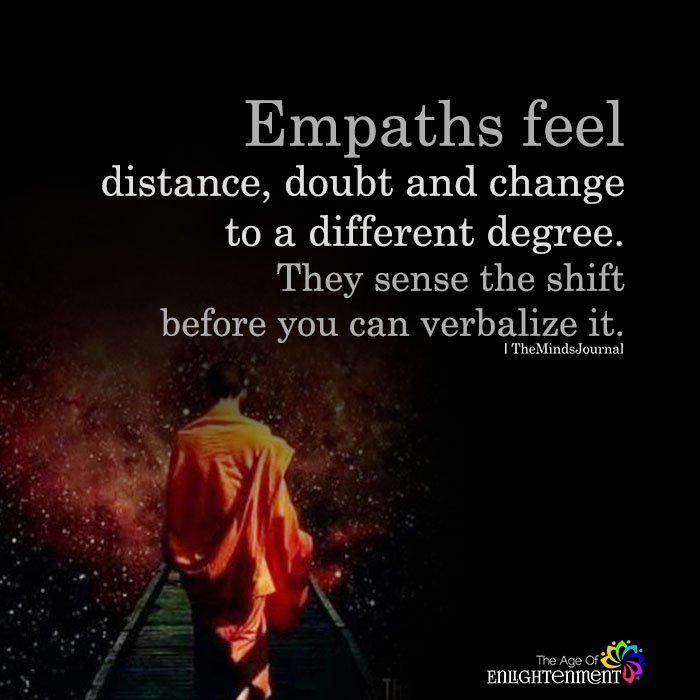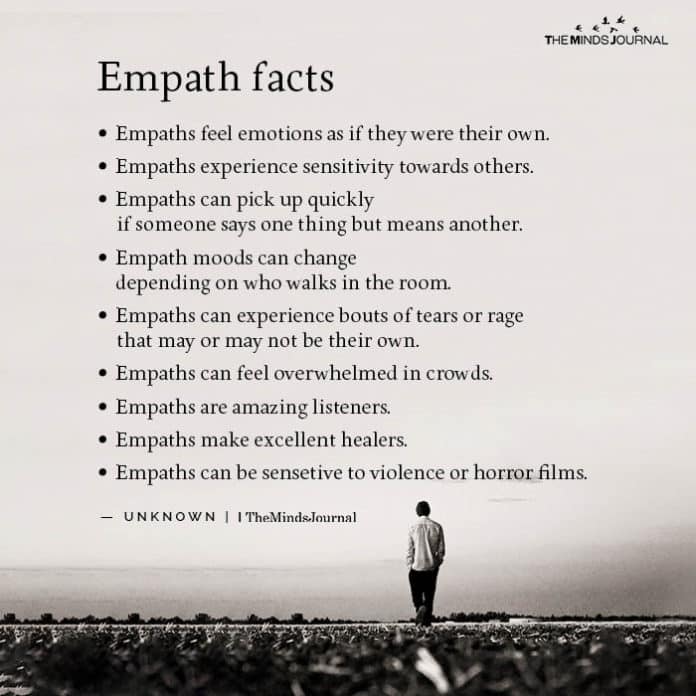Empaths are unique as they can absorb someone’s emotions and feelings. As this creates certain challenges, an empath experiences life very differently.
Being an empath is difficult
Empaths are highly sensitive to others’ emotions which makes them exceptionally understanding, compassionate, and caring. Empaths have a superpower that allows them to easily sense and feel someone’s thoughts and emotions as their own feelings. This is why most highly sensitive people or HSPs identify themselves as an empath. However, life can be very different for an empath than others.
The heightened awareness and sensitivity of empaths enable them to actually experience the pain and suffering of others around them. As all this empathy can become highly overwhelming, an empath experiences high levels of stress, anxiety, depression, exhaustion, panic attacks, and other mental and emotional issues.
Empaths “are highly prone to anxiety, and are likely to struggle with digestive issues,” writes mental health advocate and counselor Wan Ting in a Medium article. She adds “They are often sensitive to the needs of others, but may not feel reciprocated. This often leads to feelings of being misunderstood and rejected… Empaths are likely to be more sensitive to the effects of substances, which can make them more prone to addictions.”
Read: Empathic Illnesses: Do You Absorb Other People’s Symptoms?

Balancing all the difficult emotions they experience from others can be very challenging and hence, they can often be easily misunderstood. Although being an empath is a gift, it can often make their lives very chaotic. With over 20% of the population being highly sensitive individuals and empaths, it is important that we gain a deeper understanding of how an empath lives life differently.
4 challenging empath experiences in life
Here are a few ways an empath experiences the world with a unique and different perspective and how they can make the most of it, as explained by bestselling author Shahida Arabi:
1. They are emotional detectives
An empath experiences energies and emotions easily. They can also pick up on subtle changes in body language, facial expressions, and tone of voice. However, as they have been abused and shamed as children for being too sensitive, HSPs have learned to “fit in” by blocking their intuitive abilities.
As their childhood trauma may result in hypervigilance, “it can also lead to a tremendous amount of intuition into the human condition,” writes Shahida. Not only are they mostly writing about life experiences, they can also tell when people are lying.
She adds “Their ability to pick up on the emotions of others in a manner that is adept and nuanced is unparalleled. When the energy in a room is high and vibrant, empaths feel the full glory of it. On the other hand, when there are emotional vampires lurking about with their pathological envy and their unwarranted spite, empaths feel the full shock of that too.”
When empowered, an empath learns how to embrace their intuitive abilities and utilize them confidently, she explains.
Read: How Empaths Can Recover from Trauma And PTSD
2. They end up in toxic relationships

They often attract toxic people and get stuck in unhealthy relationships that can lead to self-destructive behavior. Empaths often become victims of malignant narcissists who feed on their energy and empathy.
Shahida writes “Empaths can heighten the energy of those around them with the wealth of their emotional labor and ability to honor other perspectives. Narcissists see that special gift in empaths and they seek to curate and collect the resources of the empath which could further aid their agenda.”
Narcissists use empaths for their own benefit and healing. Toxic people know how to use an empath’s compassion to exploit them and not take responsibility for their own toxic behavior. This is why an empath experiences love and relationships differently than others.
It is only when an empath learns to put their own needs ahead of others, they can manage to break free of this toxicity and finally start to nourish and heal themselves with self-love and self-care.
Shahida writes that empowered empaths know “how to engage in radical self-care, with the full conviction that the more they learn to care for themselves, the more they’ll have to give to others.”
Read: When An Empath Loves A Narcissist, This Is How It Ends
3. They can absorb negativity easily
Empaths tend to act like an emotional sponge. They take in all the emotions, both negative and positive, of whoever they are interacting with, which ends up greatly influencing their own thoughts, emotions, and moods.
This is one of the reasons why Highly sensitive people tend to avoid large crowds. “Empaths can become indiscriminate emotional sponges if they’re not careful, absorbing negativity or toxic shame that isn’t theirs to carry,” Shahida explains.
Even if you do not say anything to an empath, they will still pick up on subtle emotional cues and instantly know what you are feeling and going through. Unless they learn to deal with others’ emotions, an empath will keep getting adversely affected by the negative emotions of others.
“From a spiritual perspective, empaths are natural healers and their birthright is healing. They come into this world to heal – to heal themselves and others – which can make them susceptible to toxic types looking to exploit their energy for their own agenda,” adds Shahida Arabi.
However, an empowered empath experiences this somewhat differently. Through grounding practices like meditation and mindfulness, they learn to manage negative energies coming from others. Moreover, different mind-body healing techniques like massage, yoga, and Reiki can help them to release the toxicity they absorb from others.
She adds “Empowered empaths benefit enormously from establishing healthy boundaries from the onset; they know what they will and will not tolerate.”
Read: 9 Important Reasons You Should Avoid Negative People If You’re An Empath
4. They are complex and multifaceted
Although empaths may be compassionate natural healers, most tend to suffer from self-doubt, anxiety, depression, and substance abuse to cope with their high levels of awareness, receptiveness, and sensitivity.
An empath experiences a wide range of emotions, whether of their own or from others. And this can make them feel highly exhausted and emotionally & physically drained.
Shahida writes “Their emotions are part of an intricate web of their own perceptions, the perceptions, reactions, and emotions of others around them, as well as their own emotions towards the way others feel.”
The intensity of residual energies from others and their own emotions can lead to self-destructive behavior if empaths don’t act cautiously and carefully. It is only by utilizing this intensity productively through healing, empaths can truly embrace their superpower. “Art therapy, journaling, exercise, and counseling are all excellent examples of ways in which empaths can express themselves and lift their energy without feeling drained,” she suggests.
Empaths and highly sensitive people need to realize that only when they nourish and heal themselves they can help others heal as well. They have to focus on their own needs and allow others to take care of them too.
Read: Empaths and Addiction: The Dangerous Relationship

Living as an empath
Empaths are different. They are unique. And they are a gift to the world, just like each and every one of us. An empath experiences life and loves differently from others, but they feel the same emotions and pain that others feel.
Here is an interesting video that you may find interesting:












Leave a Reply